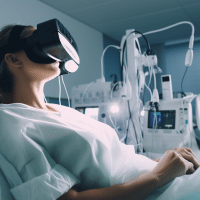Reimagining Medical Research: The Advancements of VR in Healthcare

The healthcare industry is a rapidly evolving field, constantly embracing new advancements and technologies to improve patient care. One such innovation that has gained significant attention is the introduction of virtual reality (VR) technology. VR is revolutionizing the way medical research is conducted by providing a powerful tool to simulate real-world scenarios, enabling researchers to gain valuable insights into the complexities of the human body and its functions.
With the aid of VR in healthcare, medical researchers can immerse themselves in a virtual environment that replicates the intricacies of the human body. This allows them to explore the inner workings of various systems and organs, providing a safe and controlled setting to study their functions in detail. By visually experiencing the complexities of the human body, researchers can develop a better understanding of how different organs interact, how diseases progress, and how to develop more effective treatment approaches.
Moreover, VR technology is enabling the creation of highly accurate and detailed models of the human body. These models can be utilized to develop innovative treatments and therapies, providing healthcare professionals with the necessary tools to address specific conditions and ailments. By leveraging VR’s capabilities, medical research is becoming more efficient and effective, leading to groundbreaking discoveries and advancements in patient care.
In essence, the integration of VR in healthcare is opening up a world of possibilities. From gaining a deeper understanding of the human body’s intricate mechanisms to developing novel treatment strategies, VR is transforming the landscape of medical research. As technology continues to evolve, we can expect even more remarkable applications of VR in healthcare, ultimately revolutionizing the way we approach and treat various medical conditions.
Exploring the Benefits of VR in Healthcare
Virtual Reality (VR) technology has revolutionized the healthcare industry, providing a groundbreaking and transformative approach to medical research and treatments. By leveraging VR in healthcare, medical professionals now have an unprecedented opportunity to explore the intricate complexities of the human body in ways that were previously unimaginable. Overall, VR in healthcare has revolutionized the way medical research and treatments are conducted.
By providing a more immersive and accurate understanding of the human body, VR has enabled medical professionals to gain a better understanding of the body and its functions. This has allowed for more accurate diagnoses and treatments, as well as a greater understanding of the human body.

Through immersive virtual environments, doctors can not only visualize but also interact with anatomical structures, gaining invaluable insights into the body and its intricate functions. This enhanced understanding has paved the way for more accurate diagnoses and targeted treatments, ultimately improving patient outcomes.
Moreover, the integration of VR in healthcare has unlocked new avenues for conducting research in a highly efficient and cost-effective manner. With virtual simulations, medical researchers can replicate complex scenarios and evaluate various treatment options without relying solely on real-life patients. This not only expedites the research process but also ensures more precise and reliable results, leading to a deeper comprehension of the human body’s intricate mechanisms.
Furthermore, VR technology has empowered medical professionals to create hyper-realistic simulations of medical procedures. These simulations provide an immersive and true-to-life experience, enabling healthcare providers to gain a comprehensive understanding of the procedural intricacies before performing them on actual patients. This enhanced preparation and precision contribute to improved patient safety and overall healthcare quality.
In conclusion, the integration of VR in healthcare has revolutionized the industry by offering unparalleled opportunities for medical research, diagnostics, and treatments. The transformative power of VR technology continues to unfold, as it empowers medical professionals to push the boundaries of medical knowledge and deliver enhanced care to patients worldwide.
The Impact of VR on Medical Research
The potential of virtual reality (VR) in healthcare is truly remarkable. By utilizing VR technology, medical researchers are able to explore the human body in ways that were never before possible. With the help of VR, medical researchers can now simulate complex medical procedures, allowing them to gain a better understanding of the human body and its functions.
Furthermore, VR in healthcare also enables medical researchers to delve deeper into the effects of certain treatments and medications on the body. By immersing themselves in virtual environments, researchers can observe how different treatments and medications interact with the body in real-time, providing invaluable insights for making more informed decisions about patient care.
This groundbreaking technology has the potential to revolutionize medical research. It empowers researchers to make more accurate and informed decisions about the best treatments for their patients, leading to improved outcomes and better quality of life. With VR, medical researchers can unlock new dimensions of knowledge about the human body and its intricate workings, paving the way for breakthroughs in diagnostics, treatment, and patient care.
The potential of VR in healthcare is vast and holds promise for the future. As the technology continues to advance, we can expect even more exciting discoveries and applications in medical research. The integration of VR into healthcare represents a paradigm shift, propelling the field forward and transforming the way we approach healthcare innovation.
Designing for the Future: How VR Monitors Impact User Experience
Coding in the Metaverse: A Guide to Programming in VR
The possibilities are truly limitless, and we are just scratching the surface of what VR can do for healthcare. With each new breakthrough, we move closer to a future where virtual reality becomes an indispensable tool in advancing medical knowledge and improving patient outcomes.
Exploring the Challenges of VR in Healthcare
The potential of virtual reality (VR) in healthcare is immense. With its ability to create immersive and interactive experiences, VR has the power to revolutionize the delivery of healthcare. From medical training to patient care, VR can transform the way healthcare professionals learn, diagnose, and treat.
In medical training, VR offers a unique opportunity for students and professionals to practice in a realistic yet controlled environment. Through virtual simulations, medical students can gain hands-on experience and refine their skills before working with real patients. This not only enhances their confidence but also reduces the risk of errors during critical procedures.

Moreover, VR can be utilized to improve patient care by providing a more engaging and personalized experience. By immersing patients in virtual environments, healthcare providers can alleviate anxiety, manage pain, and enhance rehabilitation. For instance, VR can transport patients to serene natural settings to ease their discomfort or simulate challenging scenarios to help overcome fears and phobias.
Furthermore, in the field of medical research, VR offers a powerful tool for exploring complex medical scenarios. Researchers can create virtual models of the human body, allowing them to study diseases, test potential treatments, and gain insights that may not be possible with traditional methods. This accelerated research process can lead to breakthrough discoveries and advancements in healthcare.
In summary, the applications of VR in healthcare are vast and promising. From training the next generation of medical professionals to improving patient outcomes and advancing medical research, VR is poised to revolutionize the healthcare industry and shape a more efficient, compassionate, and effective future for all.
The Future of VR in Healthcare
The future of healthcare is being revolutionized by the rapid advancements of virtual reality (VR) technology. In the realm of healthcare, VR is not just a tool for entertainment, but a powerful tool that is reshaping the way medical professionals conduct research and administer treatments. VR in healthcare is also being used to create more immersive and interactive experiences for patients. By utilizing VR, medical professionals can create virtual simulations that allow patients to explore their own bodies and gain a better understanding of their medical conditions.
Step into the Ring: The Thrilling World of VR Boxing
Tech Meets Imagination: A Glimpse into the Latest VR Innovations
This can help patients better understand their medical conditions and make informed decisions about their treatments. Additionally, VR can be used to create virtual simulations of medical procedures, allowing medical professionals to practice and perfect their techniques before performing them on real patients. The possibilities of VR in healthcare are endless, and the advancements in this technology are only just beginning. As VR technology continues to evolve, medical professionals will be able to explore new and innovative ways to treat and diagnose patients.
With the help of VR, medical research and treatments will be reimagined and revolutionized.
With the integration of VR into healthcare, medical professionals are now able to explore new frontiers in medical research and treatments. By immersing themselves in virtual environments, doctors and researchers can simulate real-world scenarios and gain invaluable insights into the complexities of the human body. This enhanced understanding allows for more precise diagnoses and more effective treatment plans.
One of the remarkable aspects of VR in healthcare is its ability to recreate a patient’s environment. By replicating the sights, sounds, and even sensations of a specific healthcare setting, medical professionals can create a realistic and immersive experience for training and practice purposes. This means that doctors can refine their skills and experiment with different treatment approaches in a safe and controlled environment before applying them to actual patients.
The potential of VR in healthcare is truly limitless. From surgical simulations to pain management techniques, VR is paving the way for innovative and personalized approaches to patient care. As the technology continues to evolve, we can expect to see even more groundbreaking applications of VR that will further enhance the future of healthcare.
Conclusion
The potential of virtual reality (VR) in healthcare is truly exciting. With the ability to simulate real-world scenarios, medical professionals can gain a better understanding of the human body and its functions, leading to more accurate diagnoses and treatment plans. VR in healthcare has already started to revolutionize medical research by enabling researchers to explore the human body in a virtual environment, providing unprecedented insights and discoveries.
Moreover, VR has the potential to enhance medical education by offering a more immersive learning experience for students. Through virtual simulations, medical students can practice procedures and surgeries in a safe and controlled environment, allowing them to develop their skills and confidence before working with real patients. This hands-on approach can significantly improve the quality of medical education and ultimately enhance patient care.
Furthermore, VR technology can also play a crucial role in patient rehabilitation and therapy. By creating immersive and interactive environments, VR can be used to help patients with physical and mental health conditions. For example, VR-based therapy has shown promising results in treating phobias, anxiety disorders, and even chronic pain. The ability to create customized and controlled environments in VR allows healthcare providers to deliver personalized and effective treatments to their patients.
While there are challenges to overcome, such as the cost and safety concerns associated with VR implementation in healthcare settings, the potential of this technology is undeniable. As VR continues to evolve and become more accessible, it will undoubtedly revolutionize the way medical research is conducted, improve medical education, and transform patient care. The future of healthcare is undoubtedly intertwined with the advancements in virtual reality technology, promising a new era of innovation and better health outcomes for all.


















